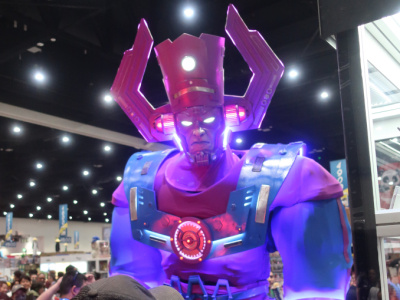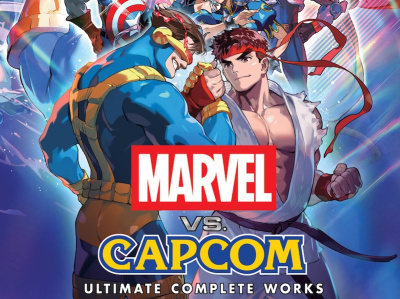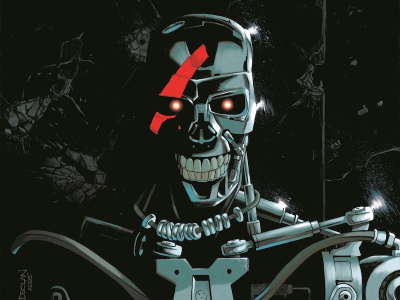 We recently caught up with IDW CEO Ted Adams for a chat about the state of the market, IDW’s line, and the digital market for comics. In Part 1, we talk about the state of the comic and graphic novel markets and IDW’s place in them. In Part 2, we talk about IDW’s diverse line. In Part 3, we talk about the market for digital comics and IDW's digital initiatives.
We recently caught up with IDW CEO Ted Adams for a chat about the state of the market, IDW’s line, and the digital market for comics. In Part 1, we talk about the state of the comic and graphic novel markets and IDW’s place in them. In Part 2, we talk about IDW’s diverse line. In Part 3, we talk about the market for digital comics and IDW's digital initiatives.We like to start out this kind of interview by just asking your general observations on the comic and graphic novel market as a whole.
In the direct market things seem relatively stable although I do feel like the direct market has always been primarily a home to sell superhero comics. I feel that over the last six or twelve months that it’s really become a place to sell superhero crossover comics in a way I think is more extreme than it’s been in the recent past. Direct market sales are relatively stable but I am concerned that we are really getting to the point where we are selling a really niche-y product. I do have some concern about that from a long term perspective. It’s not terribly new information from the standpoint that the direct market has almost always been there just to support superhero comics. I feel that within that niche of superhero comics we’re getting even more niche. I do have some concerns about that.
In the book channel business has been great. We really expanded our book channel business in 2009. We saw increased sales with just about every major customer there, probably the biggest increase being with Amazon. We publish a lot of books that have more of a mass market appeal and have found a nice home in that channel.
You mentioned the superhero crossover comics have been in vogue the last year or so. Does that make you feel that people are being forced to buy more titles per customer and that the underlying number of customers may not be that broad or that large or might even be shrinking?
I do think that if you look at the data that’s on ICv2, for the number one selling comic, that number doesn’t seem to be going up. If anything it’s been going down. I am concerned that we’re losing more customers than we’re bringing in.
I get why everybody does crossovers. The crossovers have always been an important part of our business but for the general consumer, that’s a tough product to understand.
I had somebody in my office a couple weeks ago interviewing for a job. He said that he’d always grown up reading comics, he loves comics and now he’s just reached an age where he can’t make it to the comic store every week. He’s reached a point now where he feels he’s got to go and read a Wikipedia page before he can pick up the latest issue of his favorite superhero comic. When he said that I thought that’s pretty astute. It really is sort of where we’re at. You’ve really got to come to any of these things with a huge built-in base of knowledge. This is kind of the nature of the beast that we’ve all created I suppose.
Most people have said that bookstores have been a tougher environment the last twelve to eighteen months. If your experience is different why do you think that is?
Maybe we were a little unique in 2009 because we had a lot of products around four major entertainment releases. We had books that tied into the Terminator, Star Trek, Transformers and GI Joe movies that all came out late spring through early summer, mid-summer last year. We had varying degrees of success with all those titles.
In addition to that we had success with things like Darwyn Cooke’s Parker book and the Complete Bloom County. We were in a position where we had books that that channel really wanted.
And things like our Library of American Comics have found a really nice home at Amazon. Amazon is actually individually a bigger market for many of those books than the direct market in total. I think maybe we make books that work better for the book channel market than some of our peers. We aren’t in the really complicated superhero crossover business. We’re a much broader, more mass market publisher than that.
One of the things we’ve been hearing about Amazon’s increase in share, which has certainly happened in the last year or so, has been that the higher a price on a product the more likely it is that Amazon has a bigger share of sales. Some people interpret that as people price-shopping who might otherwise buy it in brick and mortar but go for the 40% discount on more expensive titles because that difference is bigger than it might be on a four dollar product. Any thoughts on that?
It’s kind of common sense. Because they discount everything it’s more or less the same discount structure across--a 30% discount on a forty dollar book is certainly more impactful than a 30% discount on a ten dollar book. I also think that Amazon is a place where if you know you want something, you can go and get it pretty easily. They basically have everything in stock all the time so it’s hard to compete against. A lot of our stuff, particularly when you’re looking at things like the Library of American Comics, are books that people want and they know they want them but they may not want to have to run all over town to try and find them.
In the direct market we’ve been seeing your share numbers creep up. Do you think that’s the licensed comics pushing you up there or are you getting the same kind of response there that you are on the strips?
We had our best year ever in the direct market. We were the #4 publisher for 2009 and we’re really proud of that fact. The direct market is always our best market and we had our best year ever without any question in 2009. I think it’s more reflective, not so much of the licensed comics but just the diversity of the line in total. Everything from the licensed comic books to creator-driven things like Locke & Key and Welcome to Hoxford and the wide range of creator-driven books that we do. Certainly the Library of American Comics has been a big part of that business for us in the direct market. Unlike some of our bigger competitors where you can point to the books that are in the top ten and those are the things that are driving much of their revenue and sales, our is much broader based. We clearly don’t have any individual comic that sells a hundred thousand copies. Our sales are much more diverse and spread out over a much wider range of titles.
Click here for Part 2.







